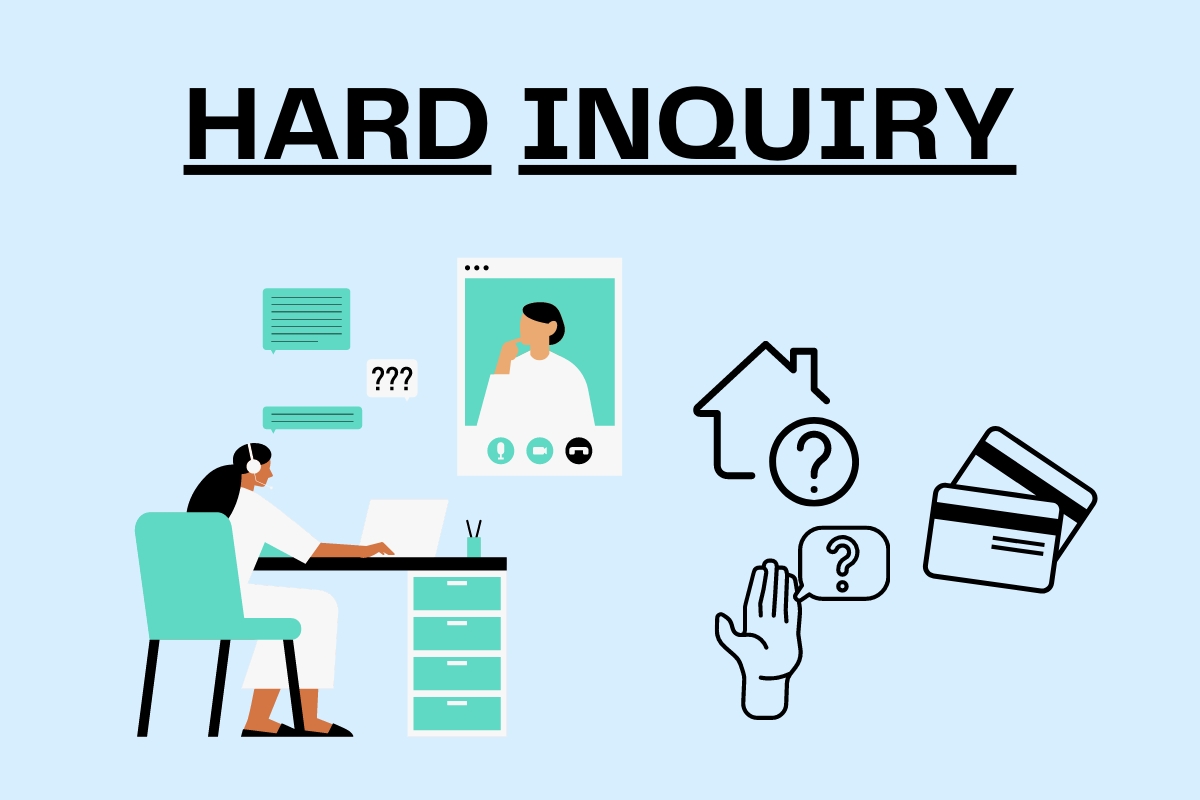

Finance
How To Remove Hard Inquiries From Credit Score
Modified: March 4, 2024
Learn how to remove hard inquiries from your credit score and improve your finance. Simple steps to boost your creditworthiness and financial health.
(Many of the links in this article redirect to a specific reviewed product. Your purchase of these products through affiliate links helps to generate commission for LiveWell, at no extra cost. Learn more)
Table of Contents
Introduction
When it comes to maintaining a healthy credit score, one of the factors that can impact it is the presence of hard inquiries on your credit report. Hard inquiries are created when a lender or financial institution checks your credit history as part of the application process for a loan or credit card. While these inquiries are necessary for lenders to assess your creditworthiness, having too many of them can have a negative impact on your credit score.
In this article, we will explore what hard inquiries are, how they can affect your credit score, and most importantly, how to remove them from your credit report. By understanding the process, you’ll be equipped with the knowledge to potentially improve your creditworthiness and boost your credit score.
If you’ve ever applied for a car loan, mortgage, or credit card, chances are you’ve encountered hard inquiries. These inquiries are typically recorded by the credit bureaus and stay on your credit report for up to two years. While a single hard inquiry might not have a significant impact on your credit score, multiple inquiries within a short period of time can raise concerns among lenders.
Why do lenders care about hard inquiries? Well, these inquiries serve as a record of your recent credit activity and can be an indication of potential financial instability. If you have a high number of recent inquiries on your credit report, it may suggest to lenders that you are actively seeking additional credit and could be under financial stress. This could make them more hesitant to extend credit to you, or result in less favorable terms or interest rates.
Therefore, it’s important to keep an eye on your credit report, understand how hard inquiries affect your credit score, and take steps to remove any inaccurate or unjustified inquiries. Removing these inquiries can help improve your creditworthiness and give you a better chance of securing loans or credit cards on more favorable terms.
What are hard inquiries?
Hard inquiries, also known as hard pulls or hard credit checks, occur when a lender or financial institution requests access to your credit report. These inquiries typically happen when you apply for a loan, credit card, or any other form of credit that requires a thorough assessment of your creditworthiness.
During the application process, the lender will review your credit history to determine whether you are a reliable borrower. The lender’s inquiry is recorded on your credit report, and it becomes part of your credit history. Each hard inquiry usually includes details such as the name of the lender, the date of the inquiry, and the type of credit you applied for.
It’s important to note that not all inquiries have the same impact on your credit score. There are two types of inquiries: hard inquiries and soft inquiries. Soft inquiries occur when a person or entity checks your credit report for reasons other than credit applications, such as background checks, pre-approval offers, or when you check your own credit report. Soft inquiries do not impact your credit score.
On the other hand, hard inquiries can have a temporary negative impact on your credit score. When a lender makes a hard inquiry, it signifies to the credit bureaus that you are actively seeking new credit. This can raise concerns regarding your ability to manage additional debt or financial obligations. Each hard inquiry can result in a small decrease in your credit score, typically around 5-10 points.
It’s essential to understand the distinction between hard and soft inquiries, as soft inquiries have no adverse effects on your credit score. However, it’s the accumulation of multiple hard inquiries over a short period of time that can potentially raise red flags with creditors and have a more significant impact on your credit score.
While it’s important to be aware of the impact hard inquiries can have, it’s not necessary to avoid them altogether. Applying for credit when needed is a normal part of managing personal finances. However, being mindful of the number of inquiries and spacing them out can help minimize the impact on your credit score.
How do hard inquiries affect credit scores?
Hard inquiries can have a direct impact on your credit score. While the impact is typically temporary, it’s still important to understand how these inquiries can affect your overall creditworthiness.
When a lender or financial institution makes a hard inquiry into your credit report, it signifies that you are actively seeking new credit. Each hard inquiry can result in a small decrease in your credit score, typically around 5-10 points. While this may not seem significant, multiple inquiries within a short period of time can have a more noticeable impact on your score.
Why do hard inquiries affect your credit score? The rationale behind it lies in the fact that lenders view multiple recent inquiries as a sign of potential financial instability or desperation for credit. This may suggest that you are taking on more debt than you can handle or potentially pose a risk as a borrower.
It’s important to note that the impact of a hard inquiry on your credit score is relatively small and diminishes over time. Most credit scoring models treat multiple inquiries within a 30-day period as a single inquiry, recognizing that you may be shopping for the best loan or credit card rates and considering multiple offers. This allows you to check rates and terms from different lenders without significantly damaging your credit score.
However, if you have a high number of inquiries over an extended period or if you have multiple inquiries for different types of credit, such as credit cards, mortgages, and car loans, it can raise concerns among lenders about your financial stability and decision-making. This can result in them perceiving you as a higher credit risk, potentially leading to higher interest rates or denial of credit altogether.
To minimize the impact of hard inquiries on your credit score, keep the following tips in mind:
- Only apply for credit when necessary and avoid unnecessary credit applications.
- Be strategic about timing your credit applications, spacing them out and avoiding multiple applications within a short period.
- Do your research and compare loan or credit card rates and terms before applying to minimize the number of inquiries.
- Consider pre-qualifying or pre-screening options to gauge your likelihood of approval before officially applying.
By understanding how hard inquiries affect your credit score and being mindful of your credit application habits, you can maintain a healthier credit profile and minimize any negative impact on your creditworthiness.
Checking your credit report for hard inquiries
Regularly checking your credit report is an important step in managing your credit health. It allows you to monitor any changes or inaccuracies in your credit history, including the presence of hard inquiries. Here’s how you can check your credit report for hard inquiries:
1. Obtain a copy of your credit report: You are entitled to a free copy of your credit report from each of the major credit bureaus – Equifax, Experian, and TransUnion – once every 12 months. You can request your reports online, by mail, or by phone.
2. Review the inquiries section: Once you have obtained your credit reports, check the section that lists all the inquiries made on your credit. Look for hard inquiries specifically, as they are the ones that can impact your credit score.
3. Understand the details of each inquiry: Examine the details of each hard inquiry, including the name of the lender, the date of the inquiry, and the type of credit you applied for. This information will help you determine whether the inquiries are valid or potentially unauthorized.
4. Identify any inaccurate or unauthorized inquiries: Pay close attention to the inquiries listed on your credit report. If you spot any inquiries that you did not authorize or recognize, it could be a sign of identity theft or fraudulent activities. In such cases, you will need to take immediate action to protect your credit by notifying the credit bureau and the respective lender.
5. Monitor for excessive inquiries: Take note of the number of inquiries listed on your credit report, especially within a specific time frame. If you notice an unusually high number of inquiries, it might be worth investigating further to ensure that your credit report accurately reflects your credit application activities.
6. Keep a record of the inquiries: It’s a good idea to maintain a personal record of the hard inquiries listed on your credit report. This can help you track your credit application history and identify any patterns or discrepancies in the future, should you need to dispute any inquiries or rectify inaccuracies.
Checking your credit report regularly for hard inquiries is essential for staying informed about your credit activity and maintaining the accuracy of your credit history. By being proactive and vigilant, you can ensure that your credit report reflects accurate information, and address any issues that may arise as soon as possible.
Disputing inaccurate hard inquiries
If you come across inaccurate or unauthorized hard inquiries on your credit report, it’s crucial to take immediate action to correct them. Here’s a step-by-step guide on how to dispute inaccurate hard inquiries:
1. Gather evidence: Collect any documentation or proof that supports your claim that the hard inquiry is inaccurate or unauthorized. This may include application receipts, correspondence with the lender, or any other relevant documents.
2. Contact the credit reporting agency: Reach out to the credit reporting agency (Equifax, Experian, or TransUnion) that provided the credit report listing the inaccurate hard inquiry. You can usually initiate a dispute online, by phone, or by mail. Provide the necessary details, including the specific inquiry you are disputing and the reason for your dispute.
3. Submit a consumer statement: If your dispute is not resolved to your satisfaction, you have the option to add a consumer statement to your credit report. This statement is a brief explanation of your side of the story, which will be included in future reports sent to lenders.
4. Contact the lender: In parallel with disputing the hard inquiry with the credit reporting agency, you can also contact the lender directly. Explain the situation and provide them with the evidence you have gathered to support your claim. Request that they remove the hard inquiry from your credit report.
5. Follow up on your dispute: Keep track of the progress of your dispute with the credit reporting agency and the lender. Follow up with them regularly to ensure that your dispute is being addressed and resolved in a timely manner. Persistence can be key in rectifying inaccuracies on your credit report.
6. Consider seeking professional help: If you encounter difficulties in resolving the dispute on your own, you may want to consider seeking assistance from a credit repair company or a consumer protection attorney. These professionals have experience in dealing with credit reporting agencies and can provide guidance and support throughout the dispute process.
Remember, disputing inaccurate hard inquiries can take time and patience. It’s important to stay organized and document each step you take in the dispute process. Regularly check your credit reports to ensure that any inaccuracies are promptly addressed and corrected. By disputing inaccurate hard inquiries, you can protect your creditworthiness and maintain an accurate credit history.
Writing a letter to the credit bureaus
If you need to dispute inaccurate hard inquiries on your credit report, one effective method is to write a letter to the credit bureaus. Here’s a step-by-step guide on how to write a letter to dispute hard inquiries:
1. Start with your contact information: Begin the letter by providing your full name, current address, and contact details. This information will make it easier for the credit bureau to identify your account and initiate the investigation.
2. Identify the inaccurate hard inquiries: Clearly state the specific hard inquiries you are disputing. Include the name of the lender, the date of the inquiry, and any additional relevant details. This will help the credit bureau investigate your claim more efficiently.
3. Explain the reason for your dispute: Clearly and concisely explain why you believe the hard inquiries are inaccurate or unauthorized. Provide any supporting evidence or documentation that you have gathered, such as receipts, correspondence with the lender, or other relevant records.
4. Request removal or correction: Clearly state in your letter that you are requesting the credit bureau to remove or correct the inaccurate hard inquiries from your credit report. Be firm but polite in your request, and emphasize that you expect a prompt and thorough investigation.
5. Include copies of supporting documents: Make copies of any documents that support your claim and include them with your letter. Do not send original documents, as they may not be returned. Clearly label each document and provide a brief explanation of its relevance to your dispute.
6. Keep copies of your letter and documents: Before sending the letter, make copies of everything for your own records. This will serve as evidence of your dispute and the documentation you provided. In case any further action is required, you will have a clear record of your efforts.
7. Send the letter via certified mail: It’s recommended to send your letter via certified mail with a return receipt requested. This serves as proof that you sent the dispute letter and provides a record of delivery. Keep the tracking number handy for future reference.
8. Follow up on the dispute: After sending the letter, follow up with the credit bureau to confirm that they have received your dispute. Keep a record of all communication with the credit bureau, including dates and names of representatives you spoke with. This will help you stay organized and ensure that your dispute is being addressed.
Writing a letter to the credit bureaus is an effective way to dispute inaccurate hard inquiries on your credit report. By providing clear and concise information, along with supporting documentation, you increase the chances of a successful resolution to your dispute. Stay persistent and patient throughout the process, and keep records of all interactions for future reference.
Following up on your dispute
Once you have submitted your dispute letter to the credit bureau regarding inaccurate hard inquiries on your credit report, it’s important to follow up to ensure that your dispute is being properly processed and resolved. Here are some steps to take when following up on your dispute:
1. Keep a record of your dispute: Maintain a file or folder with all the documents related to your dispute, including your dispute letter, copies of supporting documentation, and any correspondence with the credit bureau. This will help you stay organized and provide a record of your efforts.
2. Track the progress: Monitor the status of your dispute to ensure that it is being processed by the credit bureau. You may be provided with a reference number or a contact person to follow up with. Use this information to track the progress and obtain updates on the investigation.
3. Allow sufficient time for investigation: Credit bureaus generally have 30-45 days to investigate and respond to your dispute. During this time, the credit bureau will contact the lender and verify the accuracy of the hard inquiry. Be patient and give the credit bureau adequate time to complete their investigation.
4. Follow up with the credit bureau: If you haven’t heard back from the credit bureau within the designated timeframe, or if you need an update on the progress of your dispute, reach out to them. Contact the designated representative or the customer service department and inquire about the status of your dispute.
5. Be persistent but polite: When following up, remain persistent yet polite when dealing with the credit bureau. Remember, the representatives you speak with are there to assist you, so maintain a professional and courteous approach. It’s important to remain calm and maintain a respectful tone throughout the process.
6. Document all communication: Each time you follow up with the credit bureau, make sure to document the date, time, the representative’s name and their response. This record will serve as evidence of your diligent efforts to resolve the dispute, should further action be required.
7. Escalate if necessary: If the credit bureau fails to respond or resolve your dispute adequately, you may need to escalate the matter. Contact a supervisor or the consumer relations department within the credit bureau to express your concerns and request further action to be taken.
8. Seek legal assistance if needed: If you have exhausted all avenues within the credit bureau and your dispute remains unresolved, you may want to consider seeking legal advice or assistance from a consumer protection attorney. They can guide you on your rights and options for further action.
By following up on your dispute, you can stay informed about the progress and ensure that your claim is being properly addressed. Stay organized, be persistent, and maintain accurate records of all communication with the credit bureau throughout the entire dispute process.
Other strategies to remove hard inquiries
In addition to disputing inaccurate hard inquiries, there are a few other strategies you can consider to potentially remove legitimate hard inquiries from your credit report. While these methods may not guarantee removal, they are worth exploring:
1. Request a goodwill adjustment: If you have a good relationship with a lender or financial institution and have made timely payments on your accounts, you can try reaching out to them and requesting a goodwill adjustment. Explain the circumstances behind the hard inquiries and politely ask if they would consider removing them as a gesture of goodwill. While not all lenders may be willing to accommodate such requests, it’s worth a try.
2. Wait for the inquiries to fall off naturally: Remember that hard inquiries remain on your credit report for up to two years. However, their impact on your credit score diminishes over time. If you experience a sudden influx of hard inquiries, you can wait patiently, and over time, their negative effect on your credit score will lessen. Focus on practicing good credit habits during this time to improve your score in other areas.
3. Limit new credit applications: By being selective and strategic with your credit applications, you can minimize future hard inquiries. Only apply for credit when necessary and avoid making multiple applications within a short period. This will help prevent new inquiries from appearing on your credit report and potentially affecting your credit score.
4. Consider credit monitoring services: Using a credit monitoring service can help you keep an eye on your credit report, including any new inquiries that might appear. Being aware of new inquiries allows you to take immediate action if you notice any unauthorized or inaccurate inquiries. Some credit monitoring services also offer assistance with disputing inaccuracies, making the process more streamlined.
5. Be cautious of credit repair companies: While there are legitimate credit repair companies that can help you navigate the dispute process, it’s essential to exercise caution. Research the company thoroughly, read reviews, and ensure they have a positive track record. Be wary of companies promising guaranteed removal of hard inquiries or demanding upfront fees. Always remember that you have the right to dispute inaccurate information on your own, without the assistance of a third party.
Keep in mind that removing legitimate hard inquiries from your credit report can be more challenging than disputing inaccuracies. However, exploring these strategies and being proactive about your credit habits can help improve your overall creditworthiness, even with the presence of some inquiries on your report.
Conclusion
Managing and maintaining a healthy credit score is a vital aspect of personal finance. Understanding how hard inquiries impact your credit score and taking the necessary steps to remove inaccurate or unauthorized inquiries can help improve your creditworthiness and provide better access to credit on favorable terms.
In this article, we explored what hard inquiries are, how they affect your credit score, and various strategies to remove them from your credit report. Checking your credit report regularly, disputing inaccurate inquiries, writing a letter to the credit bureaus, and following up on your dispute are important steps in rectifying any discrepancies in your credit history.
It’s crucial to remember that prevention is better than cure when it comes to hard inquiries. Being mindful of your credit application habits, spacing out credit applications, and only applying for credit when necessary can help minimize the number of inquiries on your credit report.
While some hard inquiries may remain on your credit report for up to two years, their impact on your score diminishes over time. By practicing good credit habits, making timely payments, and maintaining a responsible approach to credit, you can mitigate the effects of hard inquiries and improve your overall creditworthiness.
Lastly, it’s important to note that improving your credit score is a gradual process that requires consistent effort. Along with addressing hard inquiries, focus on other factors that influence your credit score, such as paying bills on time, keeping credit utilization low, and maintaining a diverse credit mix. By taking a holistic approach to your credit health, you can set yourself up for long-term financial success.
Remember, each individual’s credit journey is unique, and it’s essential to tailor your approach based on your specific circumstances. By staying informed, being proactive, and taking the necessary steps to address hard inquiries, you can pave the way for a stronger credit profile and greater financial opportunities.














